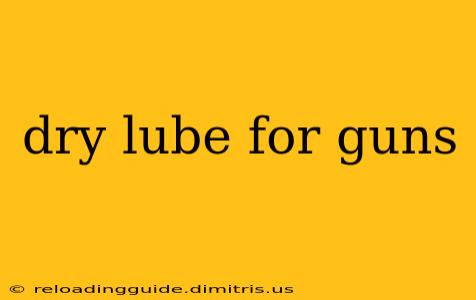Dry lubes for firearms have rapidly gained popularity among shooters and gun enthusiasts. Unlike traditional gun oils, dry lubes offer several advantages, particularly in harsh conditions and for specific applications. This comprehensive guide will explore the benefits, drawbacks, and proper application of dry lubes for your firearms.
What is Dry Lube?
Dry lube, also known as dry film lubricant, isn't truly "dry" in the sense of being completely absent of lubrication. Instead, it utilizes a unique formulation that creates a thin, durable, and low-friction coating. This coating often consists of a solid lubricant like PTFE (polytetrafluoroethylene, commonly known as Teflon) suspended in a carrier that evaporates after application, leaving behind the lubricating film. This film provides superior protection against friction and wear, even in extreme conditions like dust, dirt, and moisture.
Benefits of Using Dry Lube for Guns
Dry lubes offer several key advantages over traditional gun oils:
- Superior Performance in Adverse Conditions: Dry lubes resist washing away from water, mud, and other contaminants, maintaining lubrication where oil might fail. This is crucial for outdoor shooting and tactical applications.
- Reduced Fouling: The thin, dry film minimizes the attraction of dirt and debris, resulting in less fouling and easier cleaning.
- Extended Lubrication: Dry lubes often provide longer-lasting lubrication than oils, reducing the frequency of cleaning and maintenance.
- Improved Accuracy: By reducing friction, dry lubes can contribute to smoother cycling and improved accuracy, especially in semi-automatic firearms.
- Non-Flammable: Many dry lubes offer a non-flammable formulation, enhancing safety, especially in hot or potentially explosive environments.
Drawbacks of Dry Lube
While dry lubes offer significant advantages, it's essential to acknowledge their limitations:
- Initial Application: Applying dry lube correctly requires a bit more precision than oiling. Too much can gum up the action, while too little might not provide sufficient lubrication.
- Not a Replacement for Cleaning: Dry lube is not a substitute for regular cleaning and maintenance. Dirt and debris should still be removed, even if the lube resists attracting them.
- Potentially Less Effective in Extremely High-Temperature Environments: While some dry lubes perform well under heat, they may not offer the same level of protection as certain high-temperature gun oils in extreme conditions.
- Not Suitable for All Firearms: Some firearms, particularly older or less precisely-machined guns, might not function as optimally with dry lube as they do with traditional gun oils.
Applying Dry Lube to Your Firearms
Proper application is critical for maximizing the benefits of dry lube. Always refer to the manufacturer's instructions, as application methods may vary slightly between brands. Generally, the process involves:
- Cleaning: Thoroughly clean and degrease the firearm before applying dry lube.
- Application: Apply a very thin, even coat to the moving parts. A little goes a long way. Avoid excessive application.
- Allow to Dry: Let the carrier solvent evaporate completely before handling or firing the firearm. This ensures only the lubricating film remains.
- Testing: Test the firearm's function after applying the dry lube to confirm smooth operation.
Choosing the Right Dry Lube
The market offers a range of dry lubes for firearms, each with its own unique properties. Factors to consider when choosing a dry lube include:
- Composition: PTFE is a common component, but some lubes utilize other materials.
- Application Method: Some are sprays, while others are applied with a cloth or brush.
- Environmental Conditions: Consider the conditions where you'll be using your firearm.
Conclusion
Dry lube presents a valuable addition to any gun owner's cleaning kit, particularly for those who operate in demanding environments. By understanding its benefits and limitations and following proper application techniques, you can maximize its performance and enhance the reliability and longevity of your firearms. Remember that regular cleaning remains paramount for firearm maintenance, regardless of the type of lubricant used.

